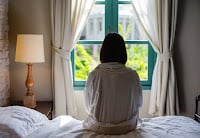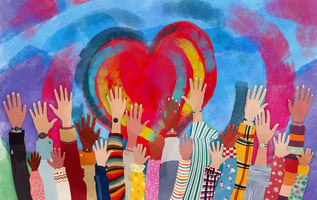1 in 4 Americans Lonelier Now Than Before Pandemic, APA Poll Finds

Experiencing consistent feelings of loneliness—defined as a lack of a meaningful or close relationship or sense of belonging—is common among U.S. adults, suggest the findings of APA’s latest Healthy Minds Monthly Poll. In early January, 30% of adults reported that they had experienced feelings of loneliness at least once a week over the past year, while 10% said they were lonely every day.
Younger people were more likely to experience feelings of loneliness, the poll found. Thirty percent of respondents aged 18 to 34 reported that they were lonely every day or several times a week. Additionally, when asked how their feelings of loneliness have changed since before the COVID-19 pandemic, 25% of respondents said they feel lonelier while 23% said they felt less lonely and 43% said their levels of loneliness had not changed.
“The Healthy Minds Monthly poll confirms loneliness is widespread, especially in young people,” APA President Petros Levounis, M.D., M.A., said in a news release. “Doctors and other clinicians can make a major difference in their patients' well-being and physical health when they ask about loneliness and how to mitigate its effects. Helping people feel less lonely is straightforward and deeply gratifying.”
The poll was conducted online January 10 to 12 among 2,200 adults by Morning Consult.
Additional findings from the poll include the following:
- Single adults were nearly twice as likely as married adults to report feelings of loneliness on a weekly basis over the past year (39% vs 22%).
- 50% of respondents said they ease their feelings of loneliness with distractions, such as TV, podcasts, or social media, while 41% said they go for a walk, and 38% said they reach out to family or friends.
- 13% said they use drugs or alcohol to ease their feelings of loneliness.
- Adults aged 18 to 34 were more likely (21%) to use drugs or alcohol when feeling lonely compared with adults aged 45 to 64 (8%).
- Selecting among several options, respondents ranked being among their families (65%), their friends (53%), or in their neighborhoods (20%) as where they felt the highest sense of community and belonging. Online communities and discussion forums (3%), sports and recreational teams (4%), and gym or fitness classes (5%) were the least likely to be selected in this category.
- Most respondents said they felt that technology helps them form new relationships (66%), helps them connect with others more frequently (75%), and is beneficial for forming and maintaining relationships (69%).
- 54% said they believed technology fosters meaningful relationships, while 46% said they believed it fosters superficial relationships.
“Clearly we believe technology can be used to connect with others,” said APA CEO and Medical Director Saul Levin, M.D., M.P.A., in the release. “In some cases, it seems to be helping us reach people who become part of our inner circles or to communicate with those who already are. However, distracting yourself when you’re feeling lonely with social media might be a double-edged sword: While it can connect, it can also lead to feelings of missing out, and we need to make sure we remain conscious of its effects on our mood. In this tech-heavy world, we should not forget the value of in-person interaction.”
For related information, see the Psychiatric News Alert “Healthy Minds Poll Provides Insight Into Americans’ Anxieties Over Past Year.”
(Image: Getty Images/iStock/Sorajack)
One More Day Left: Vote in APA’s 2024 National Election
The polls for APA’s 2024 national election will soon close. Vote now through tomorrow, January 31, using your election ballot (sent by email) or the APA election website. Detailed information about the candidates and campaigning guidelines can also be accessed on the site.





